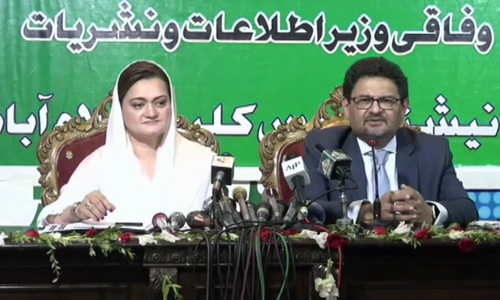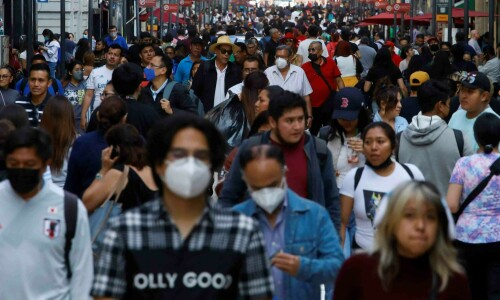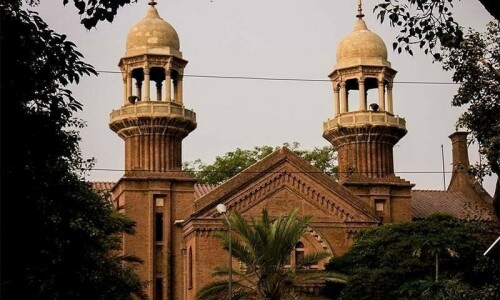Finance Minister Miftah Ismail said on Thursday that the government would try its best to maintain petrol prices and assured that even if the rates were increased, no new tax or levy would be imposed.
The previous PTI government had announced a four-month freeze (until June 30) on petrol and electricity prices on February 28 as part of a series of measures to bring relief to the public.
The PML-N led coalition government has severely criticised the previous Imran-led government for first failing to control fuel prices in the country and later for "derailing" the International Monetary Fund (IMF) programme through fuel subsidies.
In recent meetings with the new finance minister, the IMF has linked the continuation of its loan programme with the reversal of fuel subsidies, which Pakistan cannot afford. But Prime Minister Shehbaz Sharif has now twice rejected the Oil and Gas Regulatory Authority's (Ogra) summaries to increase fuel prices — a move that has been criticised by experts.
Ismail, in his presser today in Karachi, said the government had previously never sold petrol at a loss because the economy could not afford it, adding that if fuel prices are not hiked in May, the treasury will lose Rs102 billion.
Ismail blamed the previous Imran Khan-led government for implementing policies that contradicted what was agreed by them during meetings with the IMF in Washington.
The government was currently accruing a loss of Rs30 per litre on petrol, he said, claiming the previous government had agreed to not only avoid a loss of Rs30 per litre but also impose a tax of Rs30 and 17pc sales tax.
The price of petrol should have been Rs245 per litre according to the agreement the former government did with the IMF, he said. However, the PML-N led government was still selling petrol at Rs145 per litre and would try its best to maintain that price, he added.
"The difference in their (PTI government's) words and actions is Rs100," he said. The incumbent government was losing Rs70 per litre on diesel, the finance minister shared, claiming that the burden of these subsidies had been placed on the public.
In his press conference today, Ismail said if the current oil prices were maintained for May — and asserted that no decision had been taken to increase them — then the government would lose Rs102 billion.
"The entire monthly cost of running the civilian government is Rs45bn, including the courts, the education and police systems. We are accruing losses of Rs102bn only on fuel which is equal to the cost of running two and a quarter governments ... This cannot happen."
The finance minister elaborated that the government had to borrow Rs102bn from the market but liquidity had been tightened. The government could no longer borrow money from the State Bank of Pakistan (SBP) because of new laws related to its autonomy, he added.
"If I did that, the federal government would have to pay interest but it would come back to the State Bank. When the SBP lends to us, it means we are printing money which increases inflation."
However, when the government borrowed money from private banks, a few other factors came into play, including a higher interest rate, he said.
The interest rate was so high, the market had been shaken, he claimed, adding that when the government borrowed from private banks, they did not have enough money left to lend to the private sector which resulted in reduced investment and industrialisation.
In addition, banks did not have enough money left to open LCs (letters of credit), leading to increased inflation, he said. "When the big companies do not have money and banks delay opening LCs, then there is a shortage of fuel because of which load-shedding increases."
Power plants
Ismail claimed that 7,500 megawatts power plants remained shut during the PTI government's tenure because they did not have fuel while 2,000 MW power plants were closed because of lack of maintenance.
The PTI government had discouraged meritocracy from the first day, he said, claiming that since the government had borrowed so much money, his ministry did not have enough to pay the Power Division to purchase fuel for the plants.
The Pakistan State Oil's (PSO) receivables were over Rs500bn and it would not be able to function if money was not provided, he said.
"In [Imran] Khan sahb's time, the PSO wrote to the energy secretary that it cannot import oil for other companies because it does not have the capacity. SNGPL (Sui Northern Gas Pipelines Limited), which supplies gas in Punjab and KP, has faced Rs200bn losses in the last three years.
"We have to fulfil that loss otherwise it will also face supply problems. We also have to give PSO money. Imran Khan's government has left problems everywhere because of incompetence and corruption."
When the PML-N government's tenure ended in 2018, the country was progressing and there was no circular debt in the gas sector, Ismail said.
"There was no load-shedding in the gas sector. Now, load-shedding in the gas sector [is because of shortage of] Rs1,500bn. Can Imran Khan get me that money?
"We left [the circular debt at] Rs1,062bn in 2018. Circular debt is at Rs2,600bn now. Will they (PTI) give me that?" he asked, questioning who would be held accountable.
















































